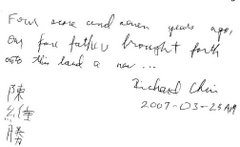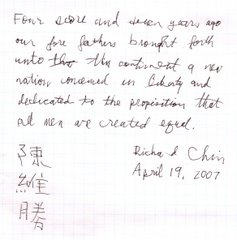Richard and I spoke to our stem cell class at Stanford this past Monday. Each week, Professor Scott asks for student volunteers to make short (10 minute) presentations on any topic pertaining to the subject of stem cells. We spoke about our experience in China, and the response from the class was tremendous - our 20 minute presentation ran over an hour. Afterwards, Professor Scott wrote about it in his blog here.
For those who want to learn more about stem cells and the latest technological advances in this area, there are free podcasts of each week's class on iTunes. Go to iTunes, click on iTunesU, then choose Stanford University, click on "Straight Talk About Stem Cells." If you have trouble accessing iTunes, Professor Scott's book, Stem Cell Now, is a great source in understanding the basics of stem cells. We read this book in the class.
Afterward our representation, many people thanked us, but we really should be thanking them for letting us share our experience and for their insightful, perceptive questions. Some of our classmates work in the medical field while others are teachers, engineers and researchers. Most have a good understanding of stem cells. Here is a sample of some of the Q&As:
Q. Did the Chinese doctors follow up with Richard after he was released from Nanshan Hospital?
A. No. We were given a discharge report with no specific instructions on how or when to follow up. We were, however, told that we could contact the hospital staff should we have any questions or concerns.
It is standard medical protocol in the U.S. for doctors to follow-up on the patient's progress after the patient is discharged from the hospital. This typically involves medical prescriptions, instructions on follow-up care and a check-up appointment with the doctor. So far we have not been contacted by the Nanshan doctors, but we have received a group email from a U.S.-based Beike representative asking Richard about his progress.
Q. How did we hear about stem cell therapy at Nanshan? What studies or reports did we read that convinced us in going to China?
A. We heard about Nanshan from fellow MJDers' experiences. There were no formal medical studies or reports published or provided by Beike about the Nanshan stem cell patients that we were aware of. We researched Beike's website, sent an inquiry to Beike and corresponded with their staff. We accept the fact that we had no guarantee that the treatment was going to work.
I distinctively remember cringing as I listened to my answer to this question. Did we sound desperate and naïve? There is so little that is published about Chinese clinical results that prospective patients mostly rely on anecdotal evidence from stem cell blogs like this one and others at stemcellschina.com. In the package of materials provided by Beike to prospective patients, there was a list of publications by Dr. Yang Bo of Nanshan Hospital, but none of these papers are easily accessible (outside of China). My suspicion is that even if they were available, the text would be in Chinese.
Q. (Directed to Prof. Scott) Were there any representatives from China at the Annual Meeting of the International Society of Stem Cell Research in Cairns, Australia last month?
A. No. The organizers have hoped that by holding the meeting in Australia that it would encourage more participants from Asian countries. Japan was well-represented.
There was some speculation from the class as to why China did not participate. One classmate who is ethnic Chinese suggested the language barrier might be a factor. Perhaps Chinese researchers and doctors are not fluent in English and thus not confident in presenting their work in English. Perhaps, she also hypothesized, their non-attendance can be attributed to the traditional Chinese belief that one should not toot one's horn for fear of being called immodest. I subscribe to the former argument.
I can understand why there is so much skepticism about stem therapy in China. The burden of proof as to whether or not the treatment works has shifted to the patients and not the Chinese doctors or researchers. Patients write about their experience and progress through blogs that are used as anecdotal testimonials. The patients then cite reports of medical visits with doctors in their home countries to further support that there is measurable improvement. In contrast, Chinese doctors seem disinterested in documenting and following up on their patients. This curious lack of interest and initiative on China's part may lead the West to believe that China has something to hide. If the treatment works, then why not show the world solid empirical data instead of relying on soft anecdotal support? Patients can talk themselves blue in the face about how they think the treatment worked for them; unless the Chinese are willing to subject the trials to peer review, however, the treatment will never gain any legitimacy in the West.
Someone in class asked us if we had any regrets about going to China. We told her that we had no regrets whatsoever because we entered into this venture without any expectations of a miracle cure. I still believe that stem cells are the future of medicine. There has been much finger-pointing about how the West is determined to short-change China's efforts. As an ethnic Chinese, I want China to succeed in becoming a premier provider of stem cell therapy. But it is not going to get there without self-advocacy and opening itself to Western scrutiny. There needs to be more effort in the documentation, disclosure and discussion of its clinical experiments. If China wants its accomplishments to be recognized in the West, she must abide by the same protocol and regulations of the Western scientific community, particularly peer review. I can only hope that discussion on blogs like these and in other forums will help facilitate greater cross-cultural understanding and dialogue on stem cell treatments.
Subscribe to:
Post Comments (Atom)



1 comment:
amazing keep up the good work Nick
Post a Comment